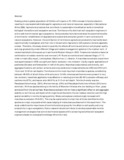Effects of tropical ecosystem engineers on soil quality and crop performance under different tillage and residue management

View/
Date
2014Author
Vanlauwe, Bernard
Six, Johan
Terano, Yusuke
Saidou, Koala
Ndabamenye, Telesphore
Hurisso, Tunsisa
Hoogmoed, Marianne
Ayuke, Fredrick
Birthe, Paul
Pulleman, Mirjam
Language
enMetadata
Show full item recordAbstract
Feeding a future global population of 9 billion will require a 70-100% increase in food production, resulting in unprecedented challenges for agriculture and natural resources, especially in Sub-saharan Africa (SSA). Agricultural practices that contribute to sustainable intensification build on beneficial biological interactions and ecosystem services. Termites are the dominant soil ecosystem engineers in arid to sub-humid tropical agro-ecosystems. Various studies have demonstrated the potential benefits of termites for rehabilitation of degraded and crusted soils and plant growth in semi-arid and arid natural ecosystems. However, the contribution of termites to agricultural productivity has hardly been experimentally investigated, and their role in Conservation Agriculture (CA) systems remains especially unclear. Therefore, this study aimed to quantify the effects of termites and ants on soil physical quality and crop productivity under different tillage and residue management systems in the medium term. A randomized block trial was set up in sub-humid Western Kenya in 2003. Treatments included a factorial combination of residue retention and removal (+R/-R) and conventional and reduced tillage (+T/-T) under a maize (Zea mays L.) and soybean (Glyxine max. L.) rotation. A macrofauna exclusion experiment was superimposed in 2005 as a split-plot factor (exclusion +ins; inclusion -ins) by regular applications of pesticides (Dursban and Endosulfan) in half of the plots. Macrofauna abundance and diversity, soil aggregate fractions, soil carbon contents and crop yields were measured between 2005 and 2012 at 0-15 cm and 15-30 cm soil depths. Termites were the most important macrofauna species, constituting between 48-63% of all soil biota, while ants were 13-34%, whereas earthworms were present in very low numbers. Insecticide application was effective in reducing termites (85-56% exclusion efficacy) and earthworms (87%), and less so ants (49-81%) at 0-15 cm soil depth. Termite diversity was low - Pseudacanthotermes sp. (33%), Microtermes sp. (24%) and Pseudacanthotermes militaris (22%) were dominant. All three species belong to the family of Macrotermitianae who are feeding on litter, grass and wood from the soil surface. Macrofauna exclusion did not have a significant effect on soil aggregate stability or soil C at any soil depth which might be attributed to the low residue retention and the high spatial variability in termite foraging activity. Maize and soybean yields strongly increased with macrofauna exclusion (P<0.001). This may be explained by the fact that all three identified termite species are major crop pests which cause lodging of maize plans as observed in this experiment. This study underlines the importance of termite functional group for the effect on soil quality and crop productivity in agro-ecosystems. Future research should contribute to develop sustainable termite management strategies that control detrimental species while conserving beneficial soil ecosystem engineers based on ecological knowledge of termite traits.
